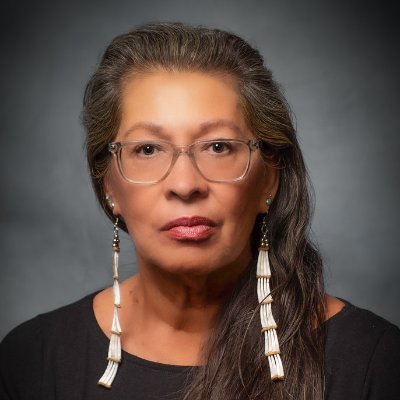Guest Opinion. The Trump administration recently disbanded the Advisory Committee on Reconciliation in Place Names, an important task force created by former Secretary of the Interior Deb Haaland to remove racist names of over 600 geological locations around Turtle Island.

Changing offensive and discriminatory place names is part of the struggle for the civil rights of Native peoples. This work helps honor our true collective history and addresses racism and colonialism.
Thanks to grassroots mobilizations, members of Congress introduced legislation to reinstate this committee and resume its urgent work of renaming.
The first Native to serve in a presidential cabinet, Deb Haaland (Laguna Pueblo) replaced 650 place names that had previously contained a racist slur against Indigenous women -- instead using the original Indigenous names.
To expand this work, Haaland created the Department of the Interior’s Advisory Committee on Reconciliation in Place Names, which identified over 1,500 additional discriminatory place names to remove -- including place names that honored people who massacred Native communities or enslaved Black people.
In a mark of disrespect and an attack on our sovereignty, the Trump administration disbanded this task force. On his first day of office, Trump also took away the traditional Indigenous name of Turtle Island’s highest mountain (Denali). His action reinforced the inaccurate history that sought to erase Native history and the true history of the root causes of how we found ourselves in this chaotic moment.
Our movement has pushed for legislation to mark the landmark of the policies that emerge when Native people are represented in every level of government. Take action to protect the former Interior Secretary Deb Haaland’s legacy and continue the work of repairing the damage of systemic racism which runs through our collective history.
As part of the Coalition for Outdoor Renaming and Education (CORE), we worked with lawmakers to introduce and reintroduce the Reconciliation in Place Names Act. This policy would systematize the urgent work of renaming racist, and derogatory place names -- creating another Advisory Committee and protecting it from the whims of presidential administrations.
Jennifer Fairbanks (Red Lake Nation), Native Organizers Alliance staffer and CORE leader, said: “Reintroducing and passing the Reconciliation in Place Names Act will be a vital step toward healing historical wounds and honoring this land's history and its original stewards.”
Judith LeBlanc (Caddo), executive director of Native Organizers Alliance Action Fund, whixh is a partner to Native Organizers Alliance.
More Stories Like This
The SAVE America Act Threatens Native Voting Rights — We Must Fight BackThe Presidential Election of 1789
Cherokee Nation: Telling the Full Story During Black History Month
Jesse Jackson Changed Politics for the Better
Native News Online at 15: Humble Beginnings, Unwavering Mission
Help us defend tribal sovereignty.
At Native News Online, our mission is rooted in telling the stories that strengthen sovereignty and uplift Indigenous voices — not just at year’s end, but every single day.
Because of your generosity last year, we were able to keep our reporters on the ground in tribal communities, at national gatherings and in the halls of Congress — covering the issues that matter most to Indian Country: sovereignty, culture, education, health and economic opportunity.
That support sustained us through a tough year in 2025. Now, as we look to the year ahead, we need your help right now to ensure warrior journalism remains strong — reporting that defends tribal sovereignty, amplifies Native truth, and holds power accountable.
 The stakes couldn't be higher. Your support keeps Native voices heard, Native stories told and Native sovereignty defended.
The stakes couldn't be higher. Your support keeps Native voices heard, Native stories told and Native sovereignty defended.
Stand with Warrior Journalism today.
Levi Rickert (Potawatomi), Editor & Publisher


